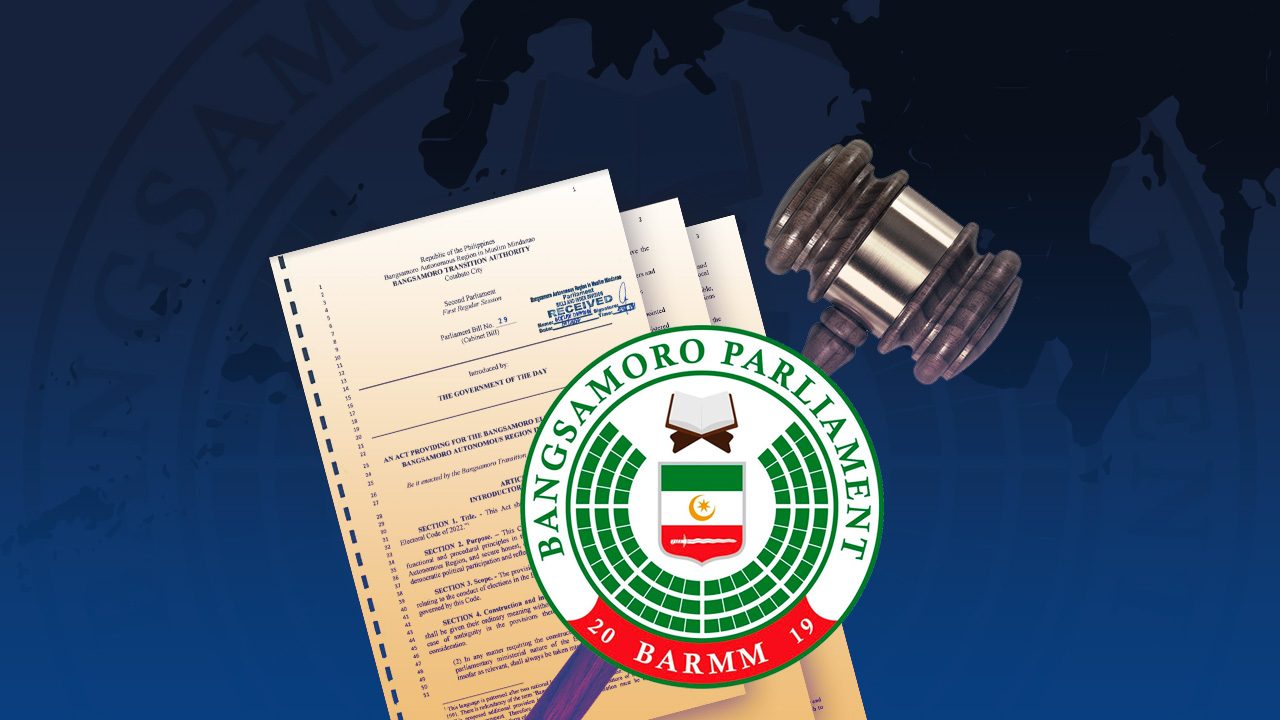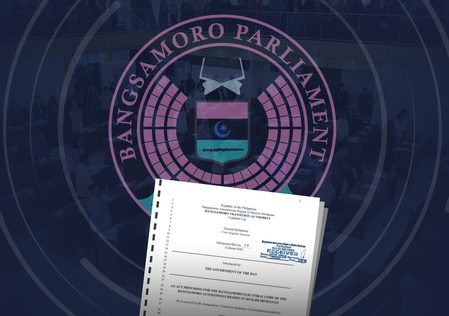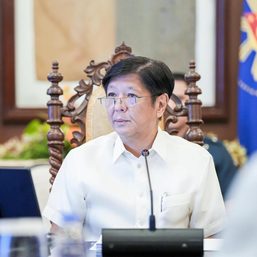SUMMARY
This is AI generated summarization, which may have errors. For context, always refer to the full article.

MANILA, Philippines – A number of election watchdogs listed suggestions on how to revise the proposed Bangsamoro electoral code (BEC), one of the prerequisites for the conduct of the 2025 elections in the Bangsamoro Autonomous Region in Muslim Mindanao (BARMM).
Among the latest to come up with their recommendations is an independent panel of experts from the Institute for Autonomy and Governance (IAG), the Mindanao State University System (MSUS), and the Local Government Development Institute (LGDI).
The group wants certain provisions removed, saying they are in conflict with the 1987 Constitution.
“The legislation of the electoral code must be pursued within the framework of the Constitution and national laws. Following the hierarchy of laws, the electoral code must be consistent, adherent and compliant with the Constitution, national laws and international law standards,” the position paper read.
So what are these contentious provisions?
On the Bangsamoro Parliament Electoral Tribunal
The Bangsamoro Transition Authority, which came up with the draft, says that under Article 4, Section 1, the Bangsamoro Parliament shall have an electoral tribunal which shall be the “sole judge” of all contests relating to the election, returns, and qualifications of parliament members.
But the group from IAG, MSUS, and LGDI pointed out that the 1987 Constitution grants the Commission on Elections (Comelec) exclusive jurisdiction over such matters.
It suggested that the provision be removed, and that the Bangsamoro Electoral Office be allowed to conduct ballot recounts and officiate hearings, and eventually make recommendations to the Comelec on matters related to granting or dismissing petitions.
On registration of political parties
Article 2, Section 8 of the proposed code gives the BEC the power to approve the registration and dissolution of political parties. But the group said this might pose constitutional questions.
“The proposal is to treat the Bangsamoro Electoral Office, with the consent of the Comelec, as both the reception and screening committee of applications for registration under the supervision and control of the Comelec,” the experts recommended to the Bangsamoro parliament.
They added that the BEO’s power over petitions for dissolutions of political parties should be limited.
The BEO could make recommendations, but it “must still go through docketing and approval or reversal by the Comelec Division,” the group said.
On voter lists
The proposed code also tasks the BEO to investigate anomalies in relation to the list of voters, and cause the delisting of voters.
But the group said that this provision should be removed because questions involving the right to vote can only be decided by courts, since even the Constitution explicitly exempts the Comelec from that function.
It also pointed out that under Section 33 of Republic Act No. 8189, municipal and metropolitan trial courts have exclusive jurisdiction over cases involving voters’ lists in their respective cities and municipalities.
On the BEO’s budget source
Article 2, Section 2 says, “The budget of the Bangsamoro Electoral Office shall be part of the yearly budget of Commission on Elections without prejudice to a supplemental budget from the parliament to augment its operational expenses.”
The panel of experts wants to reword this sentence, so that any supplemental budget will go to the Comelec first, instead of directly to the BEO.
“The provision diminishes and is potentially in conflict with COMELEC’s status as an of ‘independent‘ constitutional commission,” the group said.
What the Comelec says
A total of 13 experts constituted the panel that came up with the position paper. They are:
- IAG executive director Benedicto Bacani
- former Comelec commissioner Luie Guia
- former justice secretary Al Agra
- former interior undersecretary Jonathan Malaya
- former ARMM interior chief Anwar Malang
- former Masbate governor Vicente Homer Revil
- former Comelec chairman’s office chief-of-staff Emil Marañon
- Samuel Anonas, College of Social Sciences and Humanities dean at Mindanao State University
- Soraidah Ali, College of Public affairs dean at Mindanao State University
- Mahid Rachman, assistant professor at the Mindanao State University
- Telibert Laoc, former executive director of the National Citizens’ Movement for Free Elections
- Aminoden Macalandap, former president of the Integrated Bar of the Philippines in Lanao del Sur
- Jashim A. Abdulrahman, associate professor at the Mindanao State University
The Comelec said it has met with Bangsamoro officials to discuss the current version of the electoral code.
“We are one with them in having a Bangsamoro Election Code. However, we are hoping that the present draft will still undergo several revisions and amendments to be more in harmony with existing laws,” Comelec Chairman George Garcia told Rappler on Thursday, February 16.
“Our study group came up with several recommendations, amendments, and a little bit of revisions of the BEC, and it was completed first week of January,” added Comelec-BARMM director Ray Sumalipao in a podcast by the Legal Network for Truthful Elections on February 10.
“During the visit of the committee on rules of the BTA, we presented that proposal for amendments in Bill No. 29, and they were receptive [to] our proposal.”
A press release by the Bangsamoro parliament said it has concluded public consultations on the code. Previous consultations were held in Manila, Basilan, Sulu, Tawi-Tawi, Maguindanao, and Cotabato City.
The parliament seeks to pass the code by the first quarter of 2023. – Rappler.com
Add a comment
How does this make you feel?










![[WATCH] #TheLeaderIWant: Filipino voters sound off on community issues a year before 2025 elections](https://www.rappler.com/tachyon/2024/05/filipino-voters-sound-off-on-community-issues-1.jpg?resize=257%2C257&crop=276px%2C0px%2C720px%2C720px)
![[Just Saying] SONA, Congress, accountability, and free speech](https://www.rappler.com/tachyon/2024/07/TL-SONA-congress-accountability-free-speech.jpg?resize=257%2C257&crop=330px%2C0px%2C1080px%2C1080px)
![[Just Saying] Reciting a hymn and pledge: Illegal, punitive, unconstitutional](https://www.rappler.com/tachyon/2024/06/20240612-reciting-hymn-pledge-unconstitutional.jpg?resize=257%2C257&crop=338px%2C0px%2C720px%2C720px)
![[Just Saying] Demonizing divorce and the mockery of our Constitution](https://www.rappler.com/tachyon/2024/06/TL-Demonizing-divorce-mocking-constitution-June-6-2024.jpg?resize=257%2C257&crop=265px%2C0px%2C720px%2C720px)
![[ANALYSIS] A Rube Goldberg cartoon of our inconvenient reality](https://www.rappler.com/tachyon/2024/05/tl-inconvenient-reality-05092024.jpg?resize=257%2C257&crop=280px%2C0px%2C720px%2C720px)
![[Vantage Point] Philippine economic reforms run into headwinds](https://www.rappler.com/tachyon/2024/05/ph-economic-headwind-may-2024.jpg?resize=257%2C257&crop_strategy=attention)
There are no comments yet. Add your comment to start the conversation.